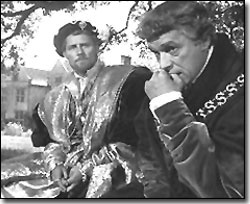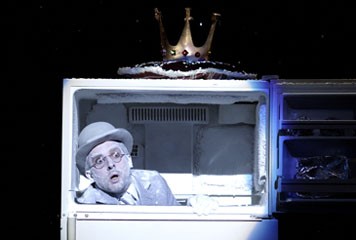 • I never saw Paul Scofield on stage. Few Americans did: he performed in this country only once, in the 1961 Broadway production of Robert Bolt’s A Man for All Seasons. So his death last week failed to make much of an impression on me. On the other hand, I never saw John Gielgud, either, yet I felt a real sense of loss when he died. What accounts for the difference?
• I never saw Paul Scofield on stage. Few Americans did: he performed in this country only once, in the 1961 Broadway production of Robert Bolt’s A Man for All Seasons. So his death last week failed to make much of an impression on me. On the other hand, I never saw John Gielgud, either, yet I felt a real sense of loss when he died. What accounts for the difference?
The answer, of course, is that Gielgud appeared in dozens of feature films, usually playing small but strikingly written parts that allowed him to make a memorable impression. Not so Scofield. He made very few movies, and only two of them, Robert Redford’s Quiz Show and the 1966 screen version of A Man for All Seasons, are reasonably well known to American audiences.
Time was when I might have used that fact to preach a sermonette about the cultural primacy of film over theater, a point I made in “Tolstoy’s Contraption,” an essay I published in The Wall Street Journal in 1999 and reprinted in A Terry Teachout Reader:
We are not accustomed to thinking of art forms as technologies, but that is what they are–which means they can be rendered moribund by new technological developments, in the way that silent films gave way to talkies and radio to TV. Well into the eighteenth century, for example, most of the West’s great storytellers wrote plays, not novels. But the development of modern printing techniques made it feasible for books to be sold at lower prices, allowing storytellers to reach large numbers of readers individually; they then turned to writing novels, and by the twentieth century the theatrical play had come to be widely regarded as a cultural backwater. To be sure, important plays continue to be written and produced, but few watch them (unless they are made into movies).
 I still stand by that paragraph. Having spent the past five years as a working drama critic, though, I hasten to point out that I never meant to suggest that live theater is less aesthetically important than film simply because fewer people see it. Nevertheless, it strikes me as both revealing and ironic that most Americans under the age of sixty–myself, alas, included–will remember Paul Scofield not as one of the greatest stage actors of the twentieth century but as the man who played Charles Van Doren’s father in Quiz Show.
I still stand by that paragraph. Having spent the past five years as a working drama critic, though, I hasten to point out that I never meant to suggest that live theater is less aesthetically important than film simply because fewer people see it. Nevertheless, it strikes me as both revealing and ironic that most Americans under the age of sixty–myself, alas, included–will remember Paul Scofield not as one of the greatest stage actors of the twentieth century but as the man who played Charles Van Doren’s father in Quiz Show.
• Ask Me Again, a two-CD set of previously unreleased recordings by the late Nancy LaMott, turned up on the Billboard jazz charts last week, ascending to the #15 spot, a few notches below Tony Bennett, Michael Bublé, Diana Krall, Wynton Marsalis, Pink Martini, and Queen Latifah. That is, to put it mildly, a decidedly miscellaneous group of artists, one whose makeup says much about the no less decidedly marginal place of jazz in postmodern America.
Needless to say, Nancy herself would have smiled to see herself described as a jazz singer: she was nothing of the kind, though she loved jazz and was comfortable working with those who played it. Even so, it pleased me greatly to see my old friend sharing a page in Billboard with Diana Krall. They never met, and an untimely death robbed Nancy of the chance to ride the same wave of changing taste that swept Diana to the well-deserved fame she now enjoys. If only…
 • Onstage humor is a delicate plant, capable of wilting without warning. I saw Mark Morris’ staging of Purcell’s King Arthur at New York City Opera a couple of weeks ago and laughed all the way through it, but it took the rest of the audience an hour or so to catch up with me. A minute or so into the evening, a woman sitting in front of me turned around and glared when I snickered at one of Morris’ more obvious visual punch lines. If a thought balloon had formed over my head at that moment, it would have read as follows: Hey, lady, didn’t you get the memo? This is supposed to be funny!
• Onstage humor is a delicate plant, capable of wilting without warning. I saw Mark Morris’ staging of Purcell’s King Arthur at New York City Opera a couple of weeks ago and laughed all the way through it, but it took the rest of the audience an hour or so to catch up with me. A minute or so into the evening, a woman sitting in front of me turned around and glared when I snickered at one of Morris’ more obvious visual punch lines. If a thought balloon had formed over my head at that moment, it would have read as follows: Hey, lady, didn’t you get the memo? This is supposed to be funny!
Then it hit me: I was surrounded by operagoers, not dancegoers. Opera buffs aren’t in the habit of laughing in the theater, not even at comic operas. Dance buffs, by contrast, are well aware of Morris’ reputation as a comedian, so much so that they sometimes laugh at scenes whose beauty makes me want to cry.
As for me, I regard comedy as the highest form of art. “Human existence,” I once wrote apropos of the music of Emmanuel Chabrier, “is so indissoluble a mixture of heartbreak and absurdity that it can often be more acutely portrayed through the refracting lens of comedy.” Alas, the world is full of earnest, humorless souls, and my impression is that they usually make a better living than those of us who find life funny–though I doubt they have nearly as good a time as we do.
